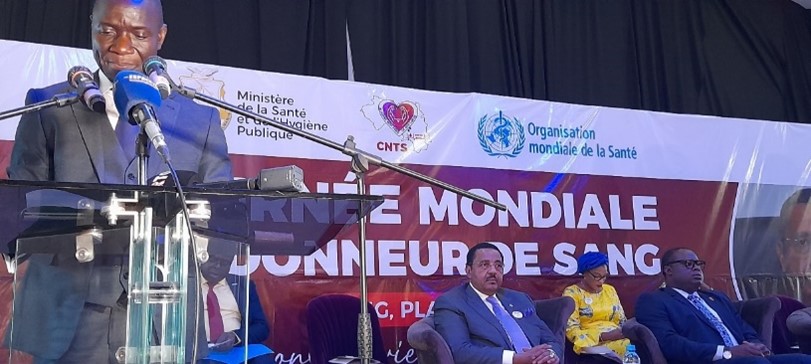Guinea has long grappled with challenges in ensuring the availability of safe blood and blood products for all patients. The scarcity of safe blood was starkly evident during the 2014 Ebola virus disease outbreak and was further exacerbated in 2020 by increased demand and decreased supply amid the COVID-19 pandemic.[1][2] Safe blood plays a crucial role in addressing diverse medical needs, including complications during childbirth, surgical procedures, and treatments for specific disorders. Given its limited shelf-life, maintaining a consistent flow of donations is imperative.[3] However, Guinea struggled with a shortage of voluntary blood donors. In response, the World Health Organization (WHO) partnered with Guinea's National Blood Transfusion Center (CNTS) and enlisted the support of prominent political figures, including the Prime Minister, to launch a public awareness campaign on World Blood Donor Day. Initially, the country had 7935 dedicated volunteer donors. Yet, during the festivities of World Blood Donor Day, led by the Prime Minister and with the active participation of the First Lady, an additional 426 donors came forward [4], significantly expanding the pool of voluntary blood donors. Coupled with WHO-provided infrastructure and solar-powered equipment, this initiative notably enhanced Guinea's access to a reliable blood supply, thereby saving lives.
Strategic intervention 3.5 of the CCS, aimed at improving access to quality health products and technologies, directly supports UNSDCF output 3 on enhancing basic health services and aligns with the national health development plan 2015-2024's sub-strategic intervention 3.4.
WHO's Key Contributions
- Engaged the Prime Minister and senior government officials in Guinea to initiate a public awareness campaign on blood donation.
- Funded initiatives to thank existing donors, attract new ones, and educate the public about donor care and health protocols.
- Equipped Guinea's National Blood Transfusion Center (CNTS) with vital supplies like blood bags and analysis equipment and introduced advanced solutions like solar-powered storage units and blood component fractionators for enhanced blood storage and safety.
- Offered technical expertise to enhance blood storage and safety protocols, streamlining the use of blood and its components.
How did Guinea, with the support of WHO, achieve this?
World Blood Donor Day, observed annually on 14 June, provides an influential platform for WHO to emphasize the critical importance of safe blood and blood products, including plasma, while also honoring the invaluable contributions of voluntary, unpaid blood donors.[5] In 2023, with financial backing from WHO through the French Muskoka Fund, a series of initiatives were implemented in Guinea for World Blood Donor Day.[6] These initiatives aimed to express gratitude to existing blood donors, attract new ones, and raise awareness about donor care and health protocols.
"Blood donated = Life saved”
- Blood donor campaign, Guinea
To strengthen Guinea's National Blood Transfusion Center (CNTS), WHO supplied vital resources, including blood bags and analysis equipment. Additionally, WHO introduced innovative solutions such as solar-powered storage units and blood component fractionators. The implementation of solar storage units resolved energy challenges, thereby improving blood storage conditions. This substantial enhancement in healthcare infrastructure represented a significant stride forward in storage capacity and safety standards.

The Director General of the Guinea National Blood Transfusion Center (CNTS) launching World Blood Donor Day events during his keynote speech.
Photo credit: WHO Guinea
In preparation for World Blood Donor Day in Guinea, WHO engaged in high-level advocacy efforts to secure commitments from the government and financial partners to support transfusion services. Organizations such as Médecins sans frontières, the Guinean Red Cross, Orange Guinée, and Assistance Médico-Sociale en Guinée mobilized the population, while the Prime Minister leveraged his political influence to foster community engagement. In addition to encouraging government officials, members of parliament, and the public to endorse blood transfusion efforts, the Prime Minister set a notable example by personally donating blood. This act was followed by other influential figures, including the First Lady, inspiring broader community involvement.
"Blood and plasma – sharing life; Donate often”
- Blood donor campaign, Guinea
The WHO provided technical support, technical documents and funding for nationwide awareness campaigns which were conducted through various national media channels, disseminating messages in five languages: French, Sousou, Malinké, Kpèlè, and Peulh. The inauguration ceremony, attended by government officials, the public, and NGOs, offered another platform for blood donation, with similar events organized in regional areas.
Donors received comprehensive guidance on maintaining good health and were educated about their entitlement to care in national health facilities. Upon reaching three donations, regular donors were issued a donor card, affording them access to essential healthcare services free of charge.
The results were striking. Voluntary blood donations tripled thanks to the comprehensive strategy, which integrated advocacy, logistical support, and community outreach, reshaping Guinea's blood donation landscape. The partnership between WHO and the Guinean government not only addressed a pressing health concern but also established the groundwork for sustainable public health progress, with the potential to save countless lives in the future.
Guinea's government remains committed to prioritizing blood transfusion services and ensuring continuous investment. Efforts will persist in engaging the government each 14 June to advocate for World Blood Donor Day and promote voluntary blood donations, underscoring the ongoing importance of this life-saving initiative.
References
- World Health Organization. WHO strengthens capacities of national blood transfusion systems in Ebola-affected countries [news]. WHO News on National Blood Transfusion Systems, accessed 9 February 2024.
- Loua et al. (2021) The International Journal of Transfusion Medicine. Impact of the COVID-19 pandemic on blood supply and demand in the WHO African Region. DOI: 10.1111/vox.13071 [publication]. Impact of COVID-19 on Blood Supply and Demand in WHO African Region, accessed 9 February 2024.
- World Health Organization. Blood products: Blood donation [Q&A]. WHO Q&A on Blood Donation, accessed 9 February 2024.
- Rapport annuel 2022 du centre national de transfusion sanguine (CNTS).
- World Health Organization. World Blood Donor Day [campaigns]. World Blood Donor Day Campaign, accessed 9 February 2024.
- Le Fonds Français Muskoka. The French Muskoka Fund [web portal]. The French Muskoka Fund, accessed 9 February 2024.

